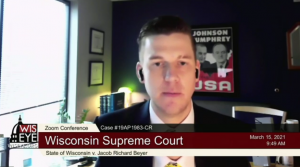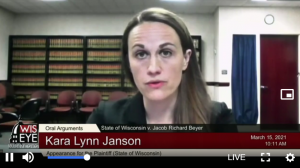Exception to guilty-plea-waiver rule debated before Supreme Court
By: Michaela Paukner, [email protected]//March 15, 2021//
Exception to guilty-plea-waiver rule debated before Supreme Court
By: Michaela Paukner, [email protected]//March 15, 2021//
The Wisconsin Supreme Court listened to a debate over an exception to the guilty-plea-waiver rule on Monday.
The case before the high court involves a defendant who stipulated to facts supporting his conviction and agreed to have the trial court find him guilty. The state Supreme Court is deciding whether the stipulated trial court allows him to preserve an issue for appeal that would otherwise be barred by the guilty-plea-waiver rule.
The rule says that a guilty plea waives all non-jurisdictional defects, including constitutional claims. However, Wisconsin Stat. § 971.31(1) provides an exception, stating that a defendant who pleads guilty does not waive the right to appeal an order denying a motion to suppress evidence. The exception prevents trials where the only contested issue is whether the denial of a motion to suppress was proper.

The state charged Jacob Richard Beyer with 10 counts of possession of child pornography. Before trial, Beyer moved to suppress evidence and filed a discovery motion for access to the state’s computer that supposedly detected the child-pornography evidence. The court denied both motions.
Beyer wanted to preserve the discovery issue for appeal, but he didn’t want to proceed to a standard trial. The parties agreed to a written stipulation that was intended to resolve the trial-court proceedings and avoid the guilty-plea-waiver rule. They stipulated to the facts underlying one of the child-pornography charges, including that Beyer knowingly possessed the image at issue, and Beyer waived his right to a jury trial and agreed to have the court find him guilty based on the stipulated facts.
The trial court sentenced Beyer to three years of initial confinement and two years of extended supervision. It also granted his request to stay imposition of his sentence pending appeal.
Beyer appealed and challenged the trial court’s denial of both motions. The Court of Appeals asked the state Supreme Court to determine whether the guilty-plea-waiver rule applies when a defendant stipulates to the inculpatory facts supporting each element of the offense and agrees to a finding of guilty at a hearing before the circuit court in which no witness testifies.
Attorney Jack S. Lindberg, who appeared for Beyer during Monday’s oral arguments, said the stipulations were the product of an adversarial proceeding, and litigating a motion to suppress does constitute a defense. He argued that the state wants the guilty-plea-waiver rule to apply not only to Beyer’s case, but also to cases where the defendant does not stipulate to the sufficiency of the evidence but presents no defense.
“It’s up to the state to meet its burden of proof by the evidence that it puts on,” Lindberg said. “I don’t think a defendant should be deemed to have pled guilty just by virtue of agreeing to allow a trial court to make its determination based on the evaluation of the state’s case in isolation.”

Assistant Attorney General Kara Lynn Janson said the state isn’t arguing that stipulations aren’t allowed, but rather, a stipulated court trial still has to meet the definition of a trial — meaning there has to be something disputed.
“We think that this is the easy case to decide what was effectively a guilty plea,” Janson said. “Mr. Beyer not only admitted that he admitted a past act, he consented to a judgment of a conviction being entered against him. That’s the hallmark of a guilty plea, and that’s what triggers the guilty-plea-waiver rule.”
She outlined two approaches that the court could take to establishing a rule about such situation, which she described as the “platinum package” and the “gold package.” The ideal line for the court to draw, in the state’s opinion, would establish that defendants can’t use the procedure to get around the guilty-plea-waiver rule and a stipulated court trial still needs to meet the definition of a trial. Janson said the second-best option would be for the court to decide, based on the facts of Beyer’s case, that cases with an admission to a past act and a consent to a judgment of conviction are effectively a guilty plea.
“It’s clear from the record that the parties are utilizing the procedure to get around the guilty-plea-waiver rule,” Janson said.
Lindberg argued that creating rules requiring courts to determine how much stipulating is equivalent to a guilty plea would further complicate the court system.
“Judicial administration is more easily effectuated by drawing a clear line in the sand indicating that anything short of a formal plea of guilty coupled with the requisite plea colloquy and admonitions is distinct from a guilty verdict rendered after stipulations are made in the order that they were here,” Lindberg said.
A recording of the full oral arguments is available via WisconsinEye. Follow @WLJReporter
Legal News
- Former law enforcement praise state’s response brief in Steven Avery case
- Eric Toney announces re-election bid for Fond du Lac County District Attorney
- Former Wisconsin Democratic Rep. Peter Barca announces new bid for Congress
- Republicans file lawsuit challenging Evers’s partial vetoes to literacy bill
- More human remains believed those of missing woman wash up on Milwaukee Co. beach
- Vice President Harris returning to Wisconsin for third visit this year
- Wisconsin joins Feds, dozens of states to hold airlines accountable for bad behavior
- Trump ahead of Biden in new Marquette poll
- Bankruptcy court approves Milwaukee Marriott Downtown ‘business as usual’ motion
- New Crime Gun Intelligence Center to launch in Chicago
- Arrest warrant proposed for Minocqua Brewing owner who filed Lawsuit against Town of Minocqua
- Wisconsin Supreme Court justices question how much power Legislature should have
WLJ People
- Power 30 Personal Injury Attorneys – Russell Nicolet
- Power 30 Personal Injury Attorneys – Benjamin Nicolet
- Power 30 Personal Injury Attorneys – Dustin T. Woehl
- Power 30 Personal Injury Attorneys – Katherine Metzger
- Power 30 Personal Injury Attorneys – Joseph Ryan
- Power 30 Personal Injury Attorneys – James M. Ryan
- Power 30 Personal Injury Attorneys – Dana Wachs
- Power 30 Personal Injury Attorneys – Mark L. Thomsen
- Power 30 Personal Injury Attorneys – Matthew Lein
- Power 30 Personal Injury Attorneys – Jeffrey A. Pitman
- Power 30 Personal Injury Attorneys – William Pemberton
- Power 30 Personal Injury Attorneys – Howard S. Sicula











